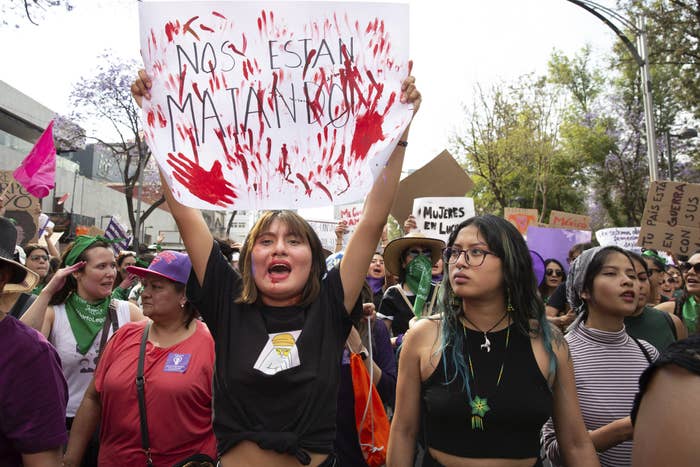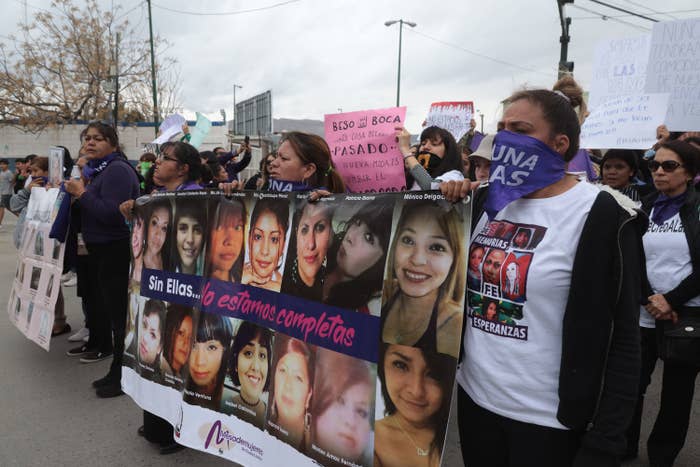
MEXICO CITY — On May 22, M.F. walked out of the doctor’s office into the bright afternoon sun and told her partner she wanted to be alone for a while. His insults and dirty looks had been particularly intense that day.
But he wouldn’t have it. As their two young daughters watched, he pulled M.F. by the hair into a waiting taxi. She fought back and he started to choke her.
M.F., who asked that only her initials be used for fear of retaliation by her partner, yelled for help at the people who had started to crowd around the car. One of them called the police. After a standoff with her partner, who threatened to take their eldest daughter, 5, with him, the cops took M.F. and the girls to a shelter for victims of domestic violence in Central Mexico.
“I didn’t even have a peso,” said M.F., who lost her job at a garden nursery last month, during a telephone interview. “I didn’t know where to go.”
For thousands of women in Mexico, the pandemic has meant a double threat: the risk of getting infected by the coronavirus, and the danger of being quarantined at home with an abusive partner. Many have been forced to flee.
And yet, President Andrés Manuel López Obrador — whose government last year was forced to backtrack on a planned budget cut for domestic violence shelters after criticism from human rights groups — has dismissed reports of rising rates of violence, saying last month that 90% of 911 calls by women are “fake.”
In March, there were 26,171 calls to 911 related to violence against women, a record high since the hotline was launched. And Línea Mujeres, a support program for women in the capital city, recorded 2,338 calls between March and May — when the quarantine was already in place in Mexico — up from 735 during the same period in 2019.
It’s not just calls. The number of women who traveled to the 60 locations that make up the National Network of Shelters to seek help during March and April was up by 77% compared to the same period last year, according to the network’s director, Wendy Figueroa.
As confinement measures are extended, Figueroa said that women affected by domestic violence are less likely to seek help as their abusers prevent them from communicating with friends and family.
“When lockdown is lifted, we are expecting a huge demand in shelter services,” said Figueroa.
M.F. and her partner began dating six and half years ago. But when she got pregnant, “the little happiness we had ended.” It started with shoves but soon escalated to kicks, straight into her belly. It only got worse from there.
Last year, M.F. went to the police to report him. The cops took down her statement and waved her away. They didn’t mention the option of leaving him and going to a shelter. She wasn’t sure if she’d ever hear from the authorities again.
She didn’t.
So M.F. sought refuge with her parents.
Her partner came to her parents’ house a month later, explaining why he had attacked her. He “complained that I hadn’t been cleaning often enough, that the girls were dirty, that I wasn’t serving him properly,” said M.F. “They believed him. They defended him. They gave me back to him.”
According to the United Nations, violence against women is a “shadow pandemic,” preceding the coronavirus, with 243 million women and girls ages 15–49 sexually or physically abused by an intimate partner around the world between April 2019 and the same month this year.

Earlier this year, several high-profile cases of gender-based violence, including the killing of a 7-year-old girl, caused outrage across Mexico. On March 8, thousands of women marched down the capital’s main thoroughfare demanding an end to femicides, or the hate killing of women. The next day, women participated in a nationwide strike, disappearing from offices and streets, to show what the deeply machista country would look like without them.
Then the coronavirus hit, and many women had no choice but to shelter in place with their abusers. M.F.’s partner, a gardener, started losing jobs from clients who worried about the spread of the coronavirus.
M.F. lost work too, after orders at the nursery where she worked dried up. At home, she kept fighting with her partner over his lackadaisical approach to the virus — he refused to wash his hands and continued hanging out with groups of people. Two people close to him fell ill with COVID-like symptoms, and M.F. feared that she and her daughters would be next.
She didn’t know that she didn’t deserve that treatment, or that shelters existed, and M.F.’s trust in the authorities had nosedived after she first reported her partner last year.
Meanwhile, López Obrador kept dismissing reports of rising violence against women during quarantine. In April, his government suspended funding to shelters for Indigenous women fleeing domestic violence. The following month, during one of his daily, hourslong press conferences, López Obrador said there hadn’t been an increase in reports of violence against women.
“Machismo exists, but so does a lot of fraternity within families,” said López Obrador, a self-described leftist who allied with a right-wing, anti-abortion, anti-LGBTQ party during his presidential run.
Activists say that statements like these, coupled with attempts at defunding resources for women who suffer violence, underscore how official state policy is misogynistic and sends abusers the message that they are likely to get away with their criminal acts.
It was just a few days after López Obrador’s statement on the “fraternal” bonds within families that M.F. went to the doctor’s office with her partner. They had gone to get the results of a test that signaled a potential tumor in her abdomen. But M.F. was worried about the spread of the coronavirus, too, so she asked the doctor about COVID-19 and what symptoms to look out for.
It was then that her partner shot her a death stare, so M.F. cut the appointment short and they walked out. That’s when he attacked her for the last time — M.F. couldn’t take it anymore, so she went to the police, and from there to the shelter.
She spent the next 15 days isolated in a room with her daughters, a precaution in case they had been exposed to the virus.
Stories like M.F.’s are all too common in Mexico. “This is a matter of public safety, of national security and of social injustice,” said Yndira Sandoval, a women’s rights activist and a member of the We Have Other Data campaign, a movement that pushes back against López Obrador’s often flippant statements on domestic violence.
“And the pandemic makes it all the more evident.”
In an attempt to address the issue of domestic violence, the government released a 30-second video last month. In it, a woman throws up her hands in annoyance after her partner accidentally drops a pile of plates.
“Count to 10, and pull out the white peace flag,” says a narrator.
The publicity campaign targeting potential abusers was immediately mocked in Mexico.
“Who made this campaign? A man?” tweeted María Salguero, founder of the National Femicide Map, a database of femicides.
Meanwhile, the killing of women continues, even as large swaths of the population remain sheltered at home. At least 144 femicides were committed between March and April, according to official data. An additional 1,014 women were killed during that time, though their cases were not recorded as femicides.
Rights groups warn that as the quarantine is extended, women trapped at home with abusive partners will become increasingly isolated, their communication channels cut off.
And officials continue to downplay the problem. This week, the governor of Puebla State, in Central Mexico, said that some of the women reported missing turned out to be hanging out with their boyfriends. He did not provide evidence.
M.F. doesn’t know where she’ll go after the shelter. If the police can guarantee that her partner won’t go near the house they shared together, she’ll go back there. But if that proves impossible, she’ll have to vanish.
“So be it, I’ll find somewhere else,” she said. “I’ll hide from him.”

